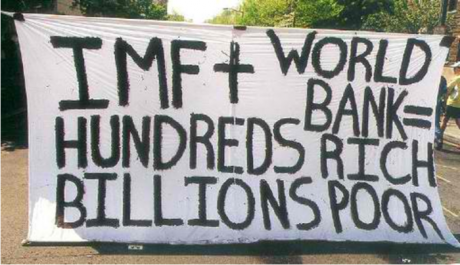Reports
You are here
IMF again, I disagree Sir

August 15, 2014
This is a title of an article that caused so much discomfort to the government of Ghana in the 1980s. The article was written as part of the protest against IMF policies. The article caused so much panic that, the whole regime descended on the author of the piece. I do not hope to suffer the same fate as the 1980s.
Each passing day seems to be saying to Ghanaians; “you are heading in a dangerous direction, you must sit up and act now.” The government of Ghana under the leadership of President John Dramani Mahama, after several denials, finally announced it is seeking the support of the International Monitory Fund (IMF) to help heal the ailing Ghanaian economy.
Ghana’s economy
Ghana’s economy is seriously weak, failing and is not working for the majority of the people. The very harsh policies that have been implemented recently—including increases in utility tariffs and fuel prices, increase in value added tax (VAT) and exchange controls rate—are themselves sufficient pointers to the harsh reality the people of Ghana are going through.
The social indicators are not good either: access to sanitation, safe drinking water, health care, education and affordable housing are still very poor for a significant number of the people in Ghana. Data available from the 2010 population census of Ghana says that about 4.3 million people (aged 15 years and above), representing close to 28 per cent of the population, have never attended school. About 34.2 per cent of the main building materials used in the rural areas are mud bricks. Close to 19 per cent of the households in Ghana have no toilet facilities. These are but a few statistics that confirm the economic hardships that the people of Ghana are facing.
IMF
But going to the IMF for support simply means that the government of Ghana will be begging for some amount of money and a promise to implement painful and harsh measures and policies put forward by the Fund. Looking at the IMF ways of operating, it is reasonably safe to assume that the bailout will be used to correct the huge budget deficit—recorded at GH¢8.7 million in 2012—through cuts to jobs and services.
The IMF policies—withdrawal of social subsidies, privatizations of state enterprise, job cuts and wage freezes—for the last three decades have not worked and will not work for the Ghanaian economy. Interestingly, on each of the many times Ghana has gone for the IMF interventions, the results have been terrible and the people of Ghana have endured more pain and sufferings.
Should Ghana accept a bailout of the IMF in its current economic situation? My attitude is that Ghana does not need it. In the present state of Ghana’s economic affairs, there is the need for the government to ensure our mineral resources are used for the benefit of the people. Ghana’s infrastructure is weak, technology is still at the basics and the whole country is heavily dependent on few raw materials that are being exported. There is the need for mobilizations of the people for the production of goods that will otherwise be imported and also genuine efforts to industrialization. Ghana must shift away from the IMF sponsored policies to policies that place Ghanaians and their welfare at the centre of everything.
Ghana is not poor, Ghanaians are made poor
Potentially Ghana has immense resources: diamond, bauxite, gold, salt, water bodies, sunshine, and many more. Ghana is far from being labeled a poor country. It is Ghanaians who are poor and they are poor because the country has repeatedly pursued the IMF and the World Bank policies.
The IMF and the World Bank prefer to describe Ghana as a model economy. However, having religiously implemented the policies prescribed by them (IMF/World Banks), the hard reality is that many citizens including pregnant women can still not get the social benefits that were expected.
There have been many names given to the IMF/World Bank policies. Whether it is call Economic Recovery Program (ERP), Structural Adjustment Program (SAP), PAMSCAD, Highly Indebted Poor Initiative (HIPC), support or bailout—what is certain is that the poor suffer more pains and very few people get the opportunity to feed on the crumbs.
Section:
Topics:










